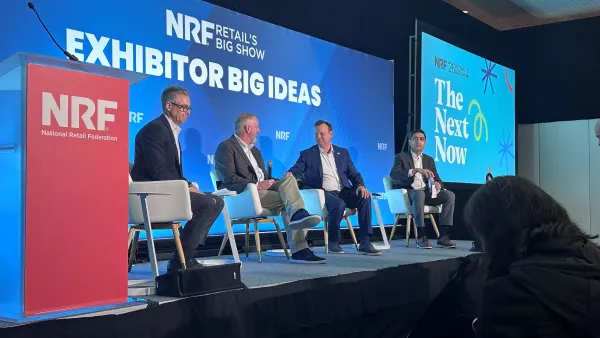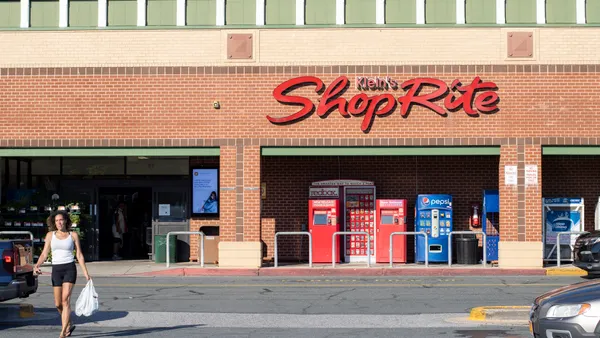LAS VEGAS — Artificial intelligence was one of the hottest topics on the Groceryshop floor this year, with numerous grocers, vendors and CPGs highlighting how they are tapping the technology.
AI has several use cases for grocers, from creating more personalized shopping experiences for consumers to assisting with data collection. Grocers who spoke at sessions and in interviews during this year’s conference noted that they are turning to the technology in different ways.
Here’s a look at how three grocers are ushering in AI solutions and what they hope to gain from the fast-developing technology.
Heritage Grocers: Pricing transformation underway
Heritage Grocers Group is currently undergoing a pricing transformation that will help the company scale pricing promotions through the use of AI capabilities, Prabash Coswatte, chief operating officer for the Hispanic grocery company, said during a Groceryshop panel on Tuesday.
In addition to more easily rolling out pricing promotions chainwide, Heritage hopes this pricing transformation will address challenges caused by the country’s current macroeconomic environment, and in particular the impact it’s having on Hispanic shoppers, Coswatte said.
“[O]ur consumer is stretched. So when the consumer is stretched, they’re looking for value… So for us, truly providing and communicating that value means something, and it’s really important to focus on that, and that’s why we started this journey,” Coswatte said.
Heritage plans to have its new system live by January, according to Coswatte. He added that the data collection side of the transformation is in place and that the grocer is currently in the design phase.
“[I]n the design phase, that’s where a lot of the real work gets done, if you will. Defining our pricing strategies, how do we go to market? — all that is important. The system doesn't solve the problem. It’s how you approach it [and] what strategy you take into it,” he said.
Thrive Market: Personalizing product recommendations
As an online-only membership marketplace for healthy foods, Thrive Market has a significant amount data and insights on health and wellness customers, CEO Nick Green said in an interview. Now, the digital retailer is seeing the powerful effects of its AI cart feature, which rolled out to its platform in late 2023.
Thrive uses the AI feature to more effectively triangulate product recommendations to new members by mapping their onboarding quiz responses against existing members and then recommending items that current customers with similar responses frequently purchase.
“We’re actually building a cart on their behalf, and over half [of] what they buy in the first order is coming from the AI cart,” Green said.
With this adaptive AI tech in full swing, the online grocer hopes to expand the experience to all purchases, as more than half of Thrive’s sales come through auto-shipped baskets, Green said.
“[We’re] not going to slip something in that [customers are] not expecting, but rather have them expect that there will be a mix of items in their cart that they have bought previously, as well as things we think that they like. We’ll distinguish between the two, and then they can decide what they want,” Green said.
Giant Eagle: Cooking up recipes

Giant Eagle is being strategic about where it implements AI, Justin Weinstein, the grocer’s chief merchandising and marketing officer, said during a Tuesday session.
The grocer recently implemented an AI-driven recipe generator, an idea that stemmed from a hackathon that the grocer hosted last year, Weinstein said. The tool, which is now embedded in the grocer’s app, allows people to save recipes and add the ingredients to their digital carts, he said.
Weinstein gave an example of a recent prompt he gave the bot: “I want a spicy meal that includes shrimp that’s relatively low calorie that includes these three items that I have in my pantry,” he said.
Weinstein said Giant Eagle is being selective about where it implements AI and watching how its consumers react to “new buzzword tech.”
“Our goal is to be smart and lay the right foundation, not to just run against every shiny use case that’s out there … I think a lot of the problems that we have to solve start with having the right process, having the right infrastructure, having clean data. And so I’m not one to just jump to the end and say AI is a solve for everything,” Weinstein said.
















